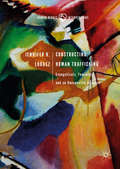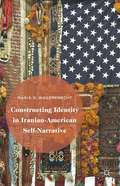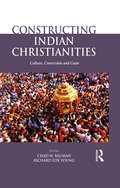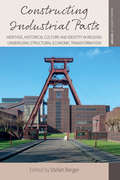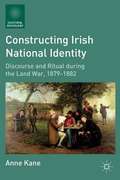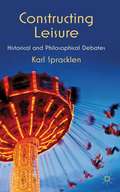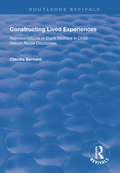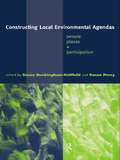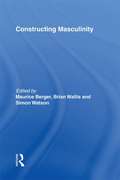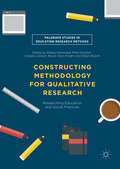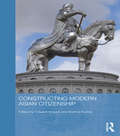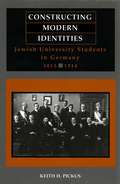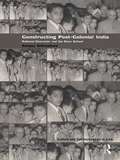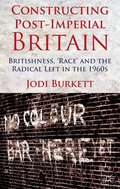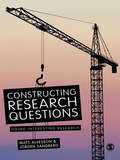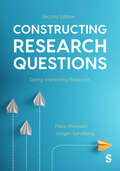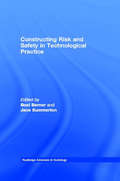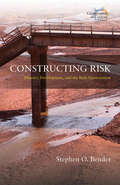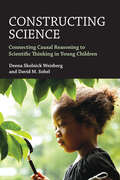- Table View
- List View
Constructing Human Trafficking: Evangelicals, Feminists, and an Unexpected Alliance (Human Rights Interventions)
by Jennifer K. LobaszHuman trafficking has come to be seen as a growing threat, and transnational advocacy networks opposed to human trafficking have succeeded in establishing trafficking as a pressing political problem. The meaning of human trafficking, however, remains an object of significant—and heated—contestation. This project draws upon feminist and poststructuralist international relations theories to offer a genealogy of U.S. neo-abolitionism. The analysis examines activist campaigns, legislative and policy debates, and legislation surrounding human trafficking and the Trafficking Victims Protection Act in order to argue that the dominant US framing of trafficking as prostitution and sex slavery is not as hegemonic as scholars and activists commonly argue. In fact, constructions of human trafficking have become more amenable to reconfiguration, paradoxically in large part because of Evangelical attempts to widen the frame. This is an empirically novel and theoretically rich account of an urgent transnational issue of concern to activists, voters and policymakers around the globe.
Constructing Identity in Iranian-American Self-Narrative
by Maria D. WagenknechtShaped by the experiences of the Iranian Revolution, Iranian-American autobiographers use this chaotic past to tell their current stories in the United States. Wagenknecht analyzes a wide range of such writing and draws new conclusions about migration, exile, and life between different and often clashing cultures.
Constructing Immigrant "Illegality"
by Cecilia Menjívar Daniel KanstroomThe topic of illegal immigration has been a major aspect of public discourse in the United States and many other immigrant-receiving countries. From the beginning of its modern invocation in the early twentieth century, the often ill-defined epithet of human illegality has figured prominently in the media; in vigorous public debates at the national, state, and local levels; and in presidential campaigns. In this collection of essays, contributors from a variety of disciplines anthropology, law, political science, religious studies, and sociology examine how immigration law shapes immigrant illegality, how the concept of immigrant illegality is deployed and lived, and how its power is wielded and resisted. The authors conclude that the current concept of immigrant illegality is in need of sustained critique, as careful analysis will aid policy discussions and lead to more just solutions.
Constructing Indian Christianities: Culture, Conversion and Caste
by Chad M. Bauman Richard Fox YoungThis volume offers insights into the current ‘public-square’ debates on Indian Christianity. Drawing on ethnographic fieldwork as well as rigorous analyses, it discusses the myriad histories of Christianity in India, its everyday practice and contestations and the process of its indigenisation. It addresses complex and pertinent themes such as Dalit Indian Christianity, diasporic nationalism and conversion. The work will interest scholars and researchers of religious studies, Dalit and subaltern studies, modern Indian history, and politics.
Constructing Industrial Pasts: Heritage, Historical Culture and Identity in Regions Undergoing Structural Economic Transformation (Making Sense of History #38)
by Stefan BergerSince the 1960s, nations across the “developed world” have been profoundly shaped by deindustrialization and other kinds of significant economic transformation. In regions in which previously dominant industries face crisis or have disappeared altogether, industrial heritage offers a fascinating window into the phenomenon’s cultural dimensions. As the contributions to this volume demonstrate, even as forms of industrial heritage provide anchors of identity for local populations, their meanings remain deeply contested, as both radical and conservative varieties of nostalgia intermingle with critical approaches and straightforward apologias for a past that was often full of pain, exploitation and struggle.
Constructing Industrial Pasts: Heritage, Historical Culture and Identity in Regions Undergoing Structural Economic Transformation (Making Sense of History)
by Stefan BergerSince the 1960s, nations across the “developed world” have been profoundly shaped by deindustrialization. In regions in which previously dominant industries faced crises or have disappeared altogether, industrial heritage offers a fascinating window into the phenomenon’s cultural dimensions. As the contributions to this volume demonstrate, even as forms of industrial heritage provide anchors of identity for local populations, their meanings remain deeply contested, as both radical and conservative varieties of nostalgia intermingle with critical approaches and straightforward apologias for a past that was often full of pain, exploitation and struggle.
Constructing Irish National Identity
by Anne KaneA major statement in both historical and cultural sociology, "Constructing Irish Nationalist Identity: Ritual and Discourse during the Land War, 1879-1882," provides a theoretical and methodological model for analyzing symbolic and social transformation in major historical events. Synthesizing the strong program in cultural sociology with eventful temporality, Anne Kane demonstrates the construction of political alliance and the emergence of a counter hegemonic cultural structure over the course of a political movement and campaign. Through deep analysis of the discursive struggles of contentious participants - tenant farmers, nationalists, and the Irish Catholic Church - in the multitudinous enchained ritualistic events of the Irish Land War, Kane illuminates the construction of a reconfigured Irish Nationalist Identity.
Constructing Leisure
by Karl SpracklenThis book looks back at the meaning and purpose of leisure in the past. But this is not a simple social history of leisure. It is not enough to write a history of leisure on its own in fact, it is impossible without engaging in the debate about what counts as leisure (in the present and in the past). Writing a history of leisure, then, entails writing a philosophy of leisure: and any history needs to be a philosophical history as well. That is the purpose of this book. It provides an account of leisure through historical time, how leisure was constructed and understood by historical actors, how communicative reason and free will interacted with instrumentality at different times, how historians have reconstructed past leisure through historiography, and finally, how writers have perceived the meaning and purpose of leisure in alternative histories. Providing a sweeping overview of the field, Karl Spracklen charts how the concept of leisure was understood in Ancient history, through to modern times, and looks at leisure in different societies and cultures including Byzantium and Asian civilizations, as well as looking at leisure and Islam. Spracklen concludes with a chapter on future histories of leisure.
Constructing Lived Experiences: Representations of Black Mothers in Child Sexual Abuse Discourses (Routledge Revivals Ser.)
by Claudia BernardThis title was first published in 2001. Employing a black feminist standpoint, Claudia Bernard offers an in-depth study of black mothers’ responses to the abuse of their children and of the factors which shape their reactions and help-seeking behaviour.
Constructing Local Environmental Agendas: People, Places and Participation
by Susan Percy Susan Buckingham-HatfieldConstructing Local Environmental Agendas draws on original contributions from specialists worldwide to argue that there is scope for local areas to improve their environments, provided local people are involved. International case studies, from UK, Europe, Australia, Pakistan and Sri Lanka, demonstrate the importance of respect for indigenous knowledge and the need to remove layers of bureaucracy from policy making.
Constructing Masculinity
by Maurice Berger Simon Watson Brian WallisThis anthology takes us beyond the status of masculinity itself, questioning society's and the media's normative concepts of the masculine, and considering the extent to which men and women can transcend these stereotypes and prescriptions.
Constructing Methodology for Qualitative Research: Researching Education and Social Practices (Palgrave Studies in Education Research Methods)
by Celeste Lawson Bruce Allen Knight Bobby Harreveld Mike Danaher Gillian BuschThis book explores the webs of vulnerability in methodological decision-making that illustrate the deceptive strength of qualitative research. Each chapter will resonate with readers differently as they read themselves into the tensions and tangles of qualitative research when confronted with the challenges of establishing methodological frameworks for educational and social enquiry. The authors are postgraduate, early career researchers and supervisors who analyse their methodological encounters with the nimble, fluid, messy and iterative processes of qualitative research. The book flows structurally from positioning the researcher within these processes to the manoeuvring of self across necessarily selective social science disciplines in education, arts and humanities. It rejuvenates the pioneering spirit, the sense of mission and innovativeness of qualitative research.
Constructing Modern Asian Citizenship (Routledge Studies in Education and Society in Asia)
by Krishna Kumar Edward VickersIn many non-Western contexts, modernization has tended to be equated with Westernization, and hence with an abandonment of authentic indigenous identities and values. This is evident in the recent history of many Asian societies, where efforts to modernize – spurred on by the spectre of foreign domination – have often been accompanied by determined attempts to stamp national variants of modernity with the brand of local authenticity: ‘Asian values’, ‘Chinese characteristics’, a Japanese cultural ‘essence’ and so forth. Highlighting (or exaggerating) associations between the more unsettling consequences of modernization and alien influence has thus formed part of a strategy whereby elites in many Asian societies have sought to construct new forms of legitimacy for old patterns of dominance over the masses. The apparatus of modern systems of mass education, often inherited from colonial rulers, has been just one instrument in such campaigns of state legitimation. This book presents analyses of a range of contemporary projects of citizenship formation across Asia in order to identify those issues and concerns most central to Asian debates over the construction of modern identities. Its main focus is on schooling, but also examines other vehicles for citizenship-formation, such as museums and the internet; the role of religion (in particular Islam) in debates over citizenship and identity in certain Asian societies; and the relationship between state-centred identity discourses and the experience of increasingly ‘globalized’ elites. With chapters from an international team of contributors, this interdisciplinary volume will appeal to students and scholars of Asian culture and society, Asian education, comparative education and citizenship.
Constructing Modern Identities: Jewish University Students in Germany, 1815-1914
by Keith PickusThe emergence of Jewish student associations in 1881 provided a forum for Jews to openly proclaim their religious heritage. By examining the lives and social dynamics of Jewish university students, Keith Pickus shows how German Jews rearranged their self-images and redefined what it meant to be Jewish. Not only did the identities crafted by these students enable them to actively participate in German society, they also left an indelible imprint on contemporary Jewish culture. Pickus's portrayal of the mutability and social function of Jewish self-definition challenges previous scholarship that depicts Jewish identity as a static ideological phenomenon. By illuminating how identities fluctuated throughout life, he demonstrates that adjusting one's social relationships to accommodate the Gentile and Jewish worlds became the norm rather than the exception for 19th-century German Jews.
Constructing Post-Colonial India: National Character and the Doon School (Culture and Communication in Asia)
by Sanjay SrivastavaAn interdisciplinary and engaging book which looks at the nature of Indian society since Independence and unpacks what post-colonialism means to Indian citizens. Using the case study of the Doon School, a famous boarding school for boys, and one of the leading educational institutions in India, the author argues that to be post-colonial in India is to be modern, rational, secular and urban. In placing post-colonialism in this concrete social context, and analysing how it is constructed, the author renders a complex and often rather abstract subject accessible.
Constructing Post-Imperial Britain
by Jodi BurkettIn the 1960s Britain wound up its overseas empire. What had once covered a quarter of the world's surface was no more. This marked a new beginning for people in those former colonies, but its impact on those in Britain was less clear. This book addresses the effects of the end of empire on the British public in a way never before done, arguing that the end of empire had a profound impact on Britons, shaping the way they saw their place in the world, their society and the ethnic and racial boundaries of their nation. This study contends that the radical, extra-parliamentary, left wing is central to understanding how British public opinion was shaped on these issues. Focussing on some of the most influential and controversial organisations of the 1960s the Campaign for Nuclear Disarmament, the Anti-Apartheid Movement, the National Union of Students and the Northern Irish Civil Rights Movement this book illuminates their central importance in constructing post-imperial Britain. "
Constructing Public Opinion: How Political Elites Do What They Like and Why We Seem to Go Along with It
by Justin LewisIs polling a process that brings "science" into the study of society? Or are polls crude instruments that tell us little about the way people actually think? The role of public opinion polls in government and mass media has gained increasing importance with each new election or poll taken. Here Lewis presents a new look at an old tradition, the first study of opinion polls using an interdisciplinary approach combining cultural studies, sociology, political science, and mass communication. Rather than dismissing polls, he considers them to be a significant form of representation in contemporary culture; he explores how the media report on polls and, in turn, how publicized results influence the way people respond to polls. Lewis argues that the media tend to exclude the more progressive side of popular opinion from public debate. While the media's influence is limited, it works strategically to maintain the power of pro-corporate political elites.
Constructing Race
by Tracy TeslowConstructing Race helps unravel the complicated and intertwined history of race and science in America. Tracy Teslow explores how physical anthropologists in the twentieth century struggled to understand the complexity of human physical and cultural variation, and how their theories were disseminated to the public through art, museum exhibitions, books, and pamphlets. In their attempts to explain the history and nature of human peoples, anthropologists persistently saw both race and culture as critical components. This is at odds with a broadly accepted account that suggests racial science was fully rejected by scientists and the public following World War II. This book offers a corrective, showing that both race and culture informed how anthropologists and the public understood human variation from 1900 through the decades following the war. The book offers new insights into the work of Franz Boas, Ruth Benedict, and Ashley Montagu, as well as less well-known figures, including Harry Shapiro, Gene Weltfish, and Henry Field.
Constructing Research Questions: Doing Interesting Research
by Mats Alvesson Jorgen SandbergAll researchers want to produce interesting and influential theories. A key step in all theory development is formulating innovative research questions that will result in interesting and significant research. Traditional textbooks on research methods tend to ignore, or gloss over, actual ways of constructing research questions. In this text, Alvesson and Sandberg develop a problematization methodology for identifying and challenging the assumptions underlying existing theories and for generating research questions that can lead to more interesting and influential theories, using examples from across the social sciences. Established methods of generating research questions in the social sciences tend to focus on 'gap-spotting', which means that existing literature remains largely unchallenged. The authors show the dangers of conventional approaches, providing detailed ideas for how one can work through such problems and formulate novel research questions that challenge existing theories and produce more imaginative empirical studies. Constructing Research Questions is essential reading for any researcher looking to formulate research questions that are interesting and novel.
Constructing Research Questions: Doing Interesting Research
by Mats Alvesson Jorgen SandbergA key step for researchers wanting to produce interesting and influential theory development is formulating innovative research questions. In this text, Alvesson and Sandberg have developed a problematization methodology for identifying and challenging the assumptions underlying existing knowledge, and for generating research questions that can lead to more impactful theories. The second edition of this popular text has been fully updated, with more illustrative examples and insights from a diverse range of recent studies which explore methods for conducting more innovative research. This book is essential reading for students and researchers looking to formulate interesting research questions and conduct more engaging and original research. Mats Alvesson is Professor of Business Administration at the University of Bath, and also affiliated with Lund University, Stockholm School of Economics and Bayes Business School, City, University of London. Jörgen Sandberg is Professor in the University of Queensland (UQ) Business School and Honorary Professor at Warwick Business School.
Constructing Research Questions: Doing Interesting Research
by Mats Alvesson Jorgen SandbergA key step for researchers wanting to produce interesting and influential theory development is formulating innovative research questions. In this text, Alvesson and Sandberg have developed a problematization methodology for identifying and challenging the assumptions underlying existing knowledge, and for generating research questions that can lead to more impactful theories. The second edition of this popular text has been fully updated, with more illustrative examples and insights from a diverse range of recent studies which explore methods for conducting more innovative research. This book is essential reading for students and researchers looking to formulate interesting research questions and conduct more engaging and original research. Mats Alvesson is Professor of Business Administration at the University of Bath, and also affiliated with Lund University, Stockholm School of Economics and Bayes Business School, City, University of London. Jörgen Sandberg is Professor in the University of Queensland (UQ) Business School and Honorary Professor at Warwick Business School.
Constructing Risk and Safety in Technological Practice (Routledge Advances in Sociology #Vol. 4)
by Boel Berner Jane SummertonModern technological systems entail risks and uncertainties of hitherto unknown dimensions. This book discusses the construction of risk and safety within a variety of empirical contexts where technologies and their risk are debated and handled by individuals, groups or organizations. With contributions from leading scholars from Europe and the USA, it presents original theoretical discussions, linked to detailed empirical case studies.
Constructing Risk: Disaster, Development, and the Built Environment (Catastrophes in Context #4)
by Stephen O. BenderReviewing current policies and practices, the book assesses the financial, economic and physical risk of building in hazardous areas, and looks at how societies are trying to create a more resilient built environment in spite of the dangers. It examines the vulnerability of social infrastructure to natural disasters and looks at policies which imperil infrastructure from natural hazard events and solutions undertaken by sovereign states, international development banks, NGOs and bilateral aid agencies.
Constructing Risk: Disaster, Development, and the Built Environment (Catastrophes in Context #4)
by Stephen O. BenderReviewing current policies and practices, the book assesses the financial, economic and physical risk of building in hazardous areas, and looks at how societies approach economic development while trying to create a more resilient built environment in spite of the dangers. It examines the vulnerability of economic and social infrastructure to natural hazard events, looks at policies which imperil infrastructure, and proposes new development approaches to be undertaken by sovereign states, international development banks, NGOs, and bilateral aid agencies.
Constructing Science: Connecting Causal Reasoning to Scientific Thinking in Young Children
by David M. Sobel Deena Skolnick WeisbergAn examination of children&’s causal reasoning capacities and how those capacities serve as the foundation of their scientific thinking.Young children have remarkable capacities for causal reasoning, which are part of the foundation of their scientific thinking abilities. In Constructing Science, Deena Weisberg and David Sobel trace the ways that young children&’s sophisticated causal reasoning abilities combine with other cognitive, metacognitive, and social factors to develop into a more mature set of scientific thinking abilities. Conceptualizing scientific thinking as the suite of skills that allows people to generate hypotheses, solve problems, and explain aspects of the world, Weisberg and Sobel argue that understanding how this capacity develops can offer insights into how we can become a more scientifically literate society.Investigating the development of causal reasoning and how it sets the stage for scientific thinking in the elementary school years and beyond, Weisberg and Sobel outline a framework for understanding how children represent and learn causal knowledge and identify key variables that differ between causal reasoning and scientific thinking. They present empirical studies suggesting ways to bridge the gap between causal reasoning and scientific thinking, focusing on two factors: contextualization and metacognitive thinking abilities. Finally, they examine children&’s explicit understanding of such concepts as science, learning, play, and teaching.
